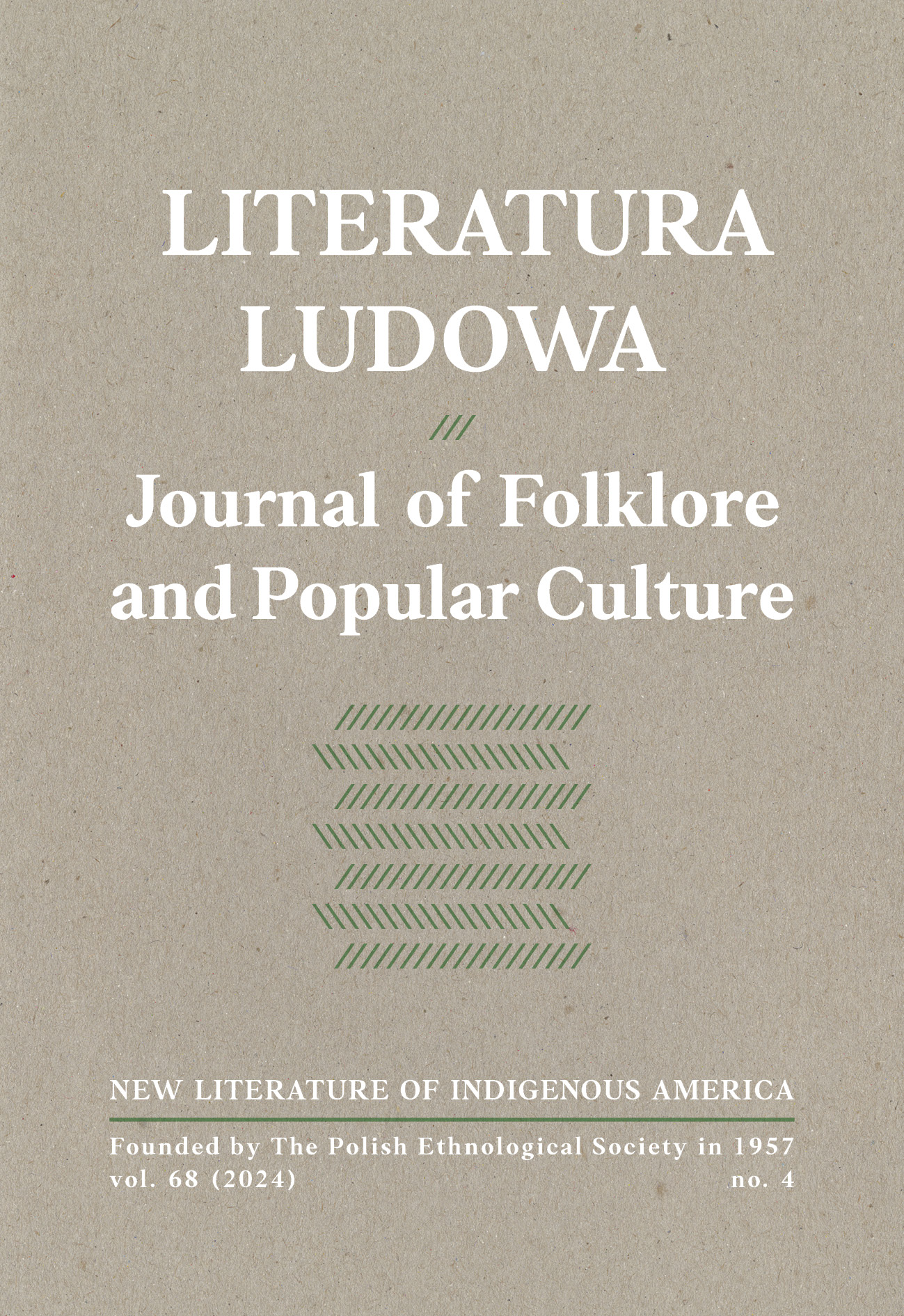“To Write My Way out of a Map and onto the Land”: Bodily Sovereignty in Billy-Ray Belcourt’s Essays A History of My Brief Body
DOI:
https://doi.org/10.12775/LL.4.2024.005Keywords
the body, embodied experience, decolonization, eroticism, sovereigntyAbstract
The article examines multiple ways in which Driftpile Cree writer and scholar Billy-Ray Belcourt applies the body and embodied experiences as a theoretical framework for decolonization of Indigenous concepts such as sexuality, eroticism, and sovereignty. According to Belcourt, the Indigenous body has not only been colonized and restrained by settler colonial heteronormativity, but also undermined by Native critics, artists, and writers as insignificant when compared with the theory of indigeneity. Therefore, in his writings, Belcourt emphasizes the centrality of the body as a theoretical framework as well as a source of (sexual) pleasure in everyday life. He advocates for “Indigenous joy” that affirms Native identities in all their dimensions, Two-Spirit, queer, etc., and thus provides emotional support in everyday struggle with manifestations of settler colonialism.
References
Akiwenzie-Damm, K. (2000). Without Reservation: Erotica, Indigenous Style. Journal of Canadian Studies/Revued’Etudes Canadiennes, 35(3), 97–104.
Belcourt, B. (2016). Masturbatory Ethics, Anarchic Objects: Notes on Decolonial Love [unpublished work]. Education and Research Archive University of Alberta. https://doi.org/10.7939/R3G73756S
Belcourt, B. (2017a). Indigenous Studies Beside Itself. Somatechnics, 7(2), 182–184.
Belcourt, B. (2017b, 4 August). The Body Remembers When the World Broke Open. Arts Everywhere. https://www.artseverywhere.ca/body-remembers-world-broke-open/
Belcourt, B. (2020). A History of My Brief Body. Two Dollar Radio.
Belcourt, B., Nixon, L. (2017, 32 May). What Do We Mean by Queer Indigenous Ethics? Canadian Art. https://canadianart.ca/features/what-do-we-mean-by-queerindigenousethics/
Colbert, J. (2021, 2 January). Cree Poet Billy-Ray Belcourt’s Memoir Imagines a More Intersectional Future. Globe & Mail. https://www.theglobeandmail.com/arts/books/article-so-muchhas-to-be-shaken-up-cree-poet-billy-ray-belcourts-memoir/
Cvetkovich, A. (2021). This Wound Is a World by Billy-Ray Belcourt. Native American and Indigenous Studies, 8(1), 227–228.
Duran, E., Duran, B., Yellow Horse Brave Heart, M., Yellow Horse-Davis, S. (1998). Healing the American Indian Soul Wound. In Y. Danieli (ed.), International Handbook of Multigenerational Legacies of Trauma (pp. 341–354). Plenum Press.
Gersie, J. (2021). Billy-Ray Belcourt. A History of My Brief Body. Transmotion, 7(1), 238–240.
Johnson, J. (2015). Black Joy in the Time of Ferguson. QED: A Journal in GLBTQ Worldmaking, 2(2), 177–183.
Lethabo King, T. (2019). The Black Shoals: Offshore Formations of Black and Native Studies. Duke University Press.
Lorde, A. (2015). Siostra outsiderka. Eseje i przemówienia (tłum. B. Szelewa). Wydawnictwo Czarna Owca.
Recollect, K. (2015). For Sisters. In D. Hayden Taylor (ed.), Me Artsy: An Exploration of Contemporary Native Arts (pp. 91–104). Douglas & McIntyre.
Simpson, L. B. (2015). The Place Where We All Live and Work Together: A Gendered Analysis of ‘Sovereignty’. In S. N. Teves, A. Smith i M. H. Raheja (eds.), Native Studies Keywords (pp. 18–24). The University of Arizona Press.
Simpson, L. B. (2017). As We Have Always Done: Indigenous Freedom Through Radical Resistance. University of Minnesota Press.
Warrior, R. (2008). ‘Your Skin Is the Map’: The Theoretical Challenge of Joy Harjo’s Erotic Poetics. In C. S. Womack, D. Heath Justice, C. B. Teuton (eds.), Reasoning Together: The Native Critics Collective (pp. 340–352). University of Oklahoma Press.
Wilson, A. (2015). Our Coming In Stories: Cree Identity, Body Sovereignty and Gender Self-Determination. Journal of Global Indigeneity, 1(1), 1–5.
Downloads
Published
How to Cite
Issue
Section
License
Copyright (c) 2025 Joanna Ziarkowska

This work is licensed under a Creative Commons Attribution-NoDerivatives 4.0 International License.
1. The authors give the publisher (Polish Ethnological Society) non-exclusive license to use the work in the following fields:a) recording of a Work / subject of a related copyright;
b) reproduction (multiplication) Work / subject of a related copyright in print and digital technique (ebook, audiobook);
c) marketing of units of reproduced Work / subject of a related copyright;
d) introduction of Work / object of related copyright to computer memory;
e) dissemination of the work in an electronic version in the formula of open access under the Creative Commons license (CC BY - ND 3.0).
2. The authors give the publisher the license free of charge.
3. The use of the work by publisher in the above mentioned aspects is not limited in time, quantitatively nor territorially.
Stats
Number of views and downloads: 311
Number of citations: 0



